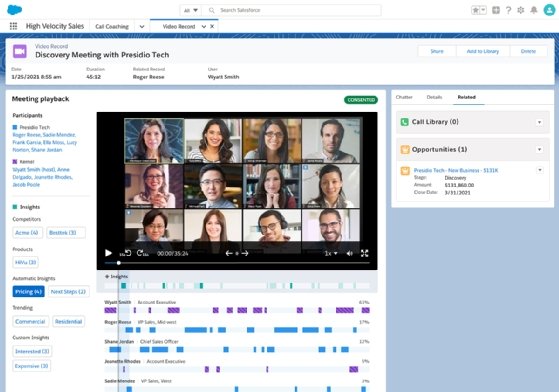Salesforce Sales Cloud is a customer relationship management (CRM) platform designed to support sales, marketing and customer support in both business-to-business and business-to-consumer contexts.
Sales Cloud is a fully customizable product that brings all customer information together in an integrated platform that incorporates marketing, lead generation, sales pipelines, customer service and business analytics. It can be easily extended by adding applications through the Salesforce AppExchange or in-house developed tools using the Salesforce Platform. Sales Cloud is provided as a service for browser-based access or through a mobile app.
Salesforce Customer 360 powers Sales Cloud, enabling an organization to connect all customer data together. It keeps a consistent view of customers from presale through customer support.
Capabilities of Sales Cloud
Salesforce Sales Cloud is designed to increase salesperson productivity and reduce time spent on administrative tasks. It can bring all sales data and tools together into a single interface.
Some capabilities of Sales Cloud include the following:
- Sales Cloud boosts efficiency. By tracking every step of the sales process, from lead generation through the sales pipeline to final quoting and billing, Sales Cloud enables salespeople to work more efficiently.
- Customer data can be imported and updated on the fly.
- Email can be integrated with Sales Cloud to track communications.
- Salesforce Einstein AI automatically classifies leads and provides insights during the sales process.
- Quotes and invoicing are covered in Sales Cloud. Sales reps can generate accurate custom quotes using configure, price and quote tools.
- Business intelligence is built into Sales Cloud. Sales data is automatically tracked and can be quickly accessed to provide up-to-date figures and predictions. The sales forecasts can inform expansion and production decisions.
- Deep integration with Customer 360 provides actionable insights into a customer base and how customers can be effectively reached.
- Built-in automation tools remove repetitive work and provide a more consistent experience. Sales emails can be automatically imported and sent with support for third-party services including Outlook and Gmail.
- Workflows enable complex behaviors from a single event.
Sales Cloud and Service Cloud
Service Cloud is Salesforce’s customer support platform. It provides tools to help associates assist customers postsale. It can help with issue tracking and resolution, along with customer tracking and case management. By using both Sales Cloud and Service Cloud tools together, organizations can maintain a single source of truth and consolidate all customer data.
AI-driven sales
Native integration of artificial intelligence (AI) and machine learning capabilities into Sales Cloud, through the Salesforce Einstein 1 platform, enables salespeople to automatically surface data-driven insights to make them more effective. These tools integrate seamlessly into the workflows.
AI-driven capabilities in Sales Cloud include the following:
- Generating sales emails.
- Summarizing calls and presentations.
- Automatic sales research and prospecting.
- Prioritizing sales leads and prospects.
- Sales forecasting.
- Finding customer relationships.

Benefits of Sales Cloud
The integrated Salesforce Sales Cloud CRM platform offers users the following benefits:
- Increased productivity. Sales Cloud reduces manual steps in the sales process by automatically capturing customer data and adding it to the CRM. At the same time, workflow automation can remove tedious and repetitive tasks.
- Customer insights. Users can find actionable insights from customer data through analytics that can help discover opportunities and trends as well as surface data from external sources.
- Improved collaboration. Using a single tool to collect customer, sales and support data can increase collaboration between workers and between different teams. And sales pipeline visibility keeps teams informed.
- Customization. Sales Cloud is customizable to fit the unique needs of organizations, so standard procedures and sales pipelines can be put in place to ensure the best outcomes and a consistent sales experience.
- Integration with other tools. Sales Cloud seamlessly integrates with the entire Salesforce platform. It can be connected to third-party tools that customers and agents are already familiar with, such as Slack and Zoom. Data can also be imported from external databases.
Sales Cloud tiers
Salesforce offers five versions of Sales Cloud on a per-user, per-month basis, from lowest to highest: Starter Suite, Pro Suite, Enterprise, Unlimited and Einstein 1 Sales. The company offers three levels of support contracts: Standard Success Plan, Premier Success Plan and Signature Success Plan.
Follow these steps to ensure a smooth and eventless CRM adoption process. Also, learn about the history and evolution, benefits and challenges, and types of CRM systems. See ways CRM improves customer experience and steps for negotiating deals with Salesforce. Compare top customer data platform software products.















